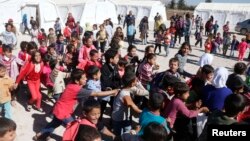The U.N. Children’s Fund says the great recession of 2008 has had a devastating impact on millions of children in rich countries.
UNICEF’s rankings of 41 wealthy countries finds 23 have failed in their duty to make life better, not worse, for their children. The report shows that 2.6 million children have sunk below the poverty line between 2008 and 2012, bringing the total number of children living in poverty in the developed world to around 76.5 million.
The countries with the worst report cards are Greece and Iceland, which have been severely affected by the global financial crisis. Iceland, in particular, had a dramatic 20 percent increase in child poverty. In general, the report says child poverty has increased significantly in southern Europe, as well as in Croatia and the three Baltic states.
But UNICEF Social and Economic Policy Specialist Yekaterina Chzhen says some countries have managed to improve the well-being of their children, during this period of economic turbulence.
“We have Chile at the top. Child poverty there actually decreased substantially by almost nine percentage points," Chzhen states. "But, the striking thing is actually that in the 15 countries at the top, child poverty has actually decreased during this period of intense economic turbulence. So, that is actually quite remarkable.”
Poland, Australia, Slovakia, Switzerland, Norway and South Korea are among the top 15 countries, which have reduced child poverty. UNICEF attributes this success to the strength of social protection policies. It says countries that have maintained their social safety nets have kept their children from sinking into poverty.
The report says the situation of child poverty has not changed in three countries - New Zealand, the Czech Republic and Germany. On the other hand, Chzhen says extreme child poverty in the United States has increased more in this economic downturn than during the recession of 1982.
“This time it is children in families where the parents are not working that are suffering particularly, and these are the children who tend to fall below the extreme poverty line," Chzhen adds."So, these families are not really helped by the earned income tax credit, unlike the ones who live in poor working families. So, the ones in extreme poverty, they tend to rely much more on food stamps.”
Chzhen notes the current safety net for the poorest people in the United States is worse than in 1982. Therefore, she says even the working poor receive little help.
The report also tracks the proportion of 15 to 24-year-olds who are not in education, employment or training. It finds the recession has hit this group especially hard. It says the worst situation is found in European Union countries where 7.5 million young people are neither working nor going to school.




